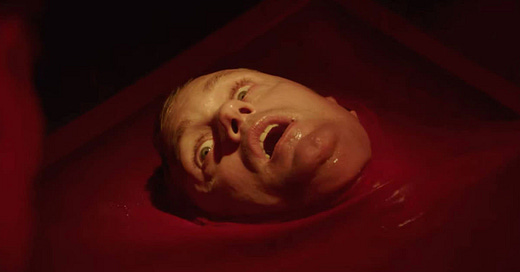“Infinity Pool” is a Depraved Meditation on Human Morality
Brandon Cronenberg uses grotesque body horror to question how punishment can turn a profit
Infinity Pool, the third feature film from director Brandon Cronenberg, is a confusing array that pits separation of his body of work from his father’s (David Cronenberg) against desperate reliance on it. This film follows the same beats of a classic Cronenberg story as it tries to push the limits of the human body, while investigating the point in that process where the body stops being human.
In a cryptic foreign country, a well known author, James Foster (Alexander Skarsgård), and his wife, Em (Cleopatra Coleman), enjoy the comfort of an expansive resort until they are lured off the property by a seductive fan, Gabi (Mia Goth), with whom James slowly becomes obsessed. But after an inebriation-induced auto accident off resort grounds, James is tossed into the local brutal incarceration system and given a choice for his punishment — he can face the death penalty, or pay a hefty sum of money and have an identical clone take his place at the gallows. James slowly becomes disturbingly enchanted by the process, and discovers an underworld of wealthy tourists, helmed by Gabi and her husband, who terrorize the local community and fetishize the indigenous culture with the understanding that they will pay their way out of any crime.
Infinity Pool exaggerates a world in which wealthy Western travelers can live without consequence and appropriate the culture of impoverished nations to live out their most perverse fantasies, all with the comfort of knowing that responsibility for their crimes can be made to disappear. The evisceration of their moral compass mirrors the expendability of their own human form, as they can buy their way out of any personal consequences through the cloning capital punishment process. James’ preconceived image of the resort as a sanctuary in a world of “foreign savages” is stripped away, signifying that the privileged have always been the most perverse and brutal.
The drug-addled sadomasochism of Gabi’s group of wealthy tourists soon spirals James into a confusing realm of hedonism and crippling guilt. Cronenberg pulls us down a long and confusing path, with disorienting cinematography and editing, to lead both James and the audience to the disturbing revelation that we have no way of gauging James’s humanity any longer. His body has been replicated so many times that any sense of morality has long since vanished, leaving an empty shell of a human — simply a physical form upon which to inflict pleasure and pain. Infinity Pool concludes with the tragic and haunting image of James sitting alone in the rain, his eyes fixed on the vast space around him — hypnotized, entranced, haunted, and terrified by the person (or lack thereof) that he has become.
Infinity Pool is an uncompromising and cruel exaggeration of a world where punishment can turn a profit and pleasure is derived from depraved cruelty. Though a bit shallow at times, Cronenberg’s unusual eye for capturing dystopia presents a distinct condemnation of power through a messy, grotesque, and disturbing lens.
OVERALL SCORE: 8/10
Infinity Pool was released on January 27 and is currently in theaters and on demand.





F-troop is still all fuzzy, dad.